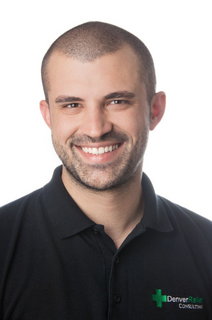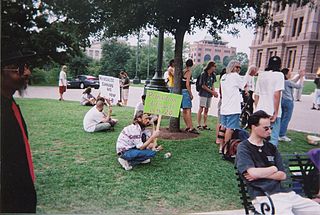Related Research Articles
The Fully Informed Jury Association (FIJA) is a United States national jury education organization, incorporated in the state of Montana as a 501(c)(3) not-for-profit organization. It works to educate citizens on their authority when they serve as jurors. FIJA's stated aims are to educate the public, provide commentary on current jury-related cases, and assist defendants with jury authority strategies — including the right to veto bad laws and the misapplication of laws by refusing to convict the defendant. The organization was formed in 1989 by Larry Dodge, a Montana businessman, and his friend Don Doig. It was formed following discussions about forming such a group at the National Libertarian Party convention in Philadelphia in 1989.

In the United States, the non-medical use of cannabis is legalized in 19 states and decriminalized in 12 states as of May 2022. Decriminalization refers to a policy of reduced penalties for cannabis offenses, typically involving a civil penalty for possessing small amounts, instead of criminal prosecution or the threat of arrest. In jurisdictions without penalty the policy is referred to as legalization, although the term decriminalization is sometimes used for this purpose as well.

In the United States, increased restrictions and labeling of cannabis as a poison began in many states from 1906 onward, and outright prohibitions began in the 1920s. By the mid-1930s cannabis was regulated as a drug in every state, including 35 states that adopted the Uniform State Narcotic Drug Act. The first national regulation was the Marihuana Tax Act of 1937.
Jury nullification in the United States has its origins in colonial America under British law. In the United States, jury nullification occurs when a jury in a criminal case reaches a verdict contrary to the weight of evidence, sometimes because of a disagreement with the relevant law. The American jury draws its power of nullification from its right to render a general verdict in criminal trials, the inability of criminal courts to direct a verdict no matter how strong the evidence, the Fifth Amendment's Double Jeopardy Clause, which prohibits the appeal of an acquittal, and the fact that jurors cannot be punished for the verdict they return.

Cannabis in Colorado has been legal for medical use since 2000 and for recreational use since late 2012. On November 7, 2000, 54% of Colorado voters approved Amendment 20, which amended the State Constitution to allow the use of marijuana in the state for approved patients with written medical consent. Under this law, patients may possess up to 2 ounces (57 g) of medical marijuana and may cultivate no more than six marijuana plants. Patients who are caught with more than this in their possession may argue "affirmative defense of medical necessity" but are not protected under state law with the rights of those who stay within the guidelines set forth by the state. The Colorado Amendment 64, which was passed by voters on November 6, 2012, led to recreational legalization in December 2012 and state-licensed retail sales in January 2014. The policy has led to cannabis tourism. There are two sets of policies in Colorado relating to cannabis use: those for medicinal cannabis and for recreational drug use along with a third set of rules governing hemp.

In the United States, the use and possession of cannabis is illegal under federal law for any purpose by way of the Controlled Substances Act of 1970 (CSA). Under the CSA, cannabis is classified as a Schedule I substance, determined to have a high potential for abuse and no accepted medical use – thereby prohibiting even medical use of the drug. Despite this, most states have legalized either or both the medical and recreational use of cannabis.

Colorado Amendment 64 was a successful popular initiative ballot measure to amend the Constitution of the State of Colorado, outlining a statewide drug policy for cannabis. The measure passed on November 6, 2012, and along with a similar measure in Washington state, marked "an electoral first not only for America but for the world."

The legal history of cannabis in the United States began with state-level prohibition in the early 20th century, with the first major federal limitations occurring in 1937. Starting with Oregon in 1973, individual states began to liberalize cannabis laws through decriminalization. In 1996, California became the first state to legalize medical cannabis, sparking a trend that spread to a majority of states by 2016. In 2012, Washington and Colorado became the first states to legalize cannabis for recreational use.

Kayvan Khalatbari is an Iranian-American entrepreneur; he was a mayoral candidate in Denver, Colorado, in 2019.

Cannabis in South Dakota is legal for medical use as of July 1, 2021, having been legalized by a ballot initiative on November 3, 2020. Prior to then, cannabis was fully illegal, with South Dakota being the only U.S. state which outlawed ingestion of controlled substances. Testing positive for cannabis can be a misdemeanor offense. South Dakota would have become the first state in US history to legalize recreational and medical cannabis simultaneously, but an amendment legalizing recreational marijuana that was approved in the same election was struck down as unconstitutional the following February. The challenge claimed the amendment violated Amendment Z, the "Single-Subject Rule". The decision was appealed to the South Dakota Supreme Court, which upheld the lower court's decision on November 24, 2021.

The Florida Medical Marijuana Legalization Initiative, also known as Amendment 2, was approved by voters in the Tuesday, November 8, 2016, general election in the State of Florida. The bill required a super-majority vote to pass, with at least 60% of voters voting for support of a state constitutional amendment. Florida already had a medical marijuana law in place, but only for those who are terminally ill and with less than a year left to live. The goal of Amendment 2 is to alleviate those suffering from these medical conditions: cancer, epilepsy, glaucoma, positive status for human immunodeficiency virus (HIV), acquired immune deficiency syndrome (AIDS), post-traumatic stress disorder (PTSD), amyotrophic lateral sclerosis (ALS), Crohn's disease, Parkinson's disease, multiple sclerosis, chronic nonmalignant pain caused by a qualifying medical condition or that originates from a qualified medical condition or other debilitating medical conditions comparable to those listed. Under Amendment 2, the medical marijuana will be given to the patient if the physician believes that the medical use of marijuana would likely outweigh the potential health risks for a patient. Smoking the medication was not allowed under a statute passed by the Florida State Legislature, however this ban was struck down by Leon County Circuit Court Judge Karen Gievers on May 25, 2018.

Cannabis in Texas is illegal for recreational use. Possession of up to two ounces is a class B misdemeanor, punishable by up to 180 days in prison, a fine of up to $2000, or both. However, several of the state's major municipalities have enacted reforms to apply lesser penalties or limit enforcement.

Cannabis in Maryland is legal for medical use and illegal for recreational use, but possession of 10 grams or less is decriminalized. In 2013, a state law was enacted to establish a state-regulated medical cannabis program. The program, known as the Natalie M. LaPrade Maryland Medical Cannabis Commission (MMCC) became operational on December 1, 2017.

Cannabis in Ohio is legal for medical use and illegal for recreational use. Since 1975, possession of up to 100 grams has been decriminalized, with several of the state's major cities having enacted further reforms. Medical use was legalized in 2016 through a bill passed by the state legislature.

Cannabis in Washington relates to a number of legislative, legal, and cultural events surrounding the use of cannabis. On December 6, 2012, Washington became the first U.S. state to legalize recreational use of marijuana and the first to allow recreational marijuana sales. The state had previously legalized medical marijuana in 1998. Under state law, cannabis is legal for medical purposes and for any purpose by adults over 21.

The Cannabis Act (C-45) of June, 2018 paved the way for the legalization of cannabis in Canada on 17 October 2018. Police and prosecution services in all Canadian jurisdictions are currently capable of pursuing criminal charges for cannabis marketing without a licence issued by Health Canada. The Supreme Court of Canada has held that the federal Parliament has the power to criminalize the possession of cannabis and that doing so does not infringe upon the Canadian Charter of Rights and Freedoms. The Ontario Court of Appeal and the Superior Court of Ontario have, however, held that the absence of a statutory provision for medical marijuana is unconstitutional, and to that extent the federal law is of no force and/or effect if a prescription is obtained. The recreational use of cannabis has been legalized by the federal government, and took effect on 17 October 2018.

Terms related to cannabis include:
Shona Banda is a Kansas resident of Garden City and medical cannabis rights advocate who was arrested for possession of cannabis in 2015. Her arrest and seizure of her child sparked a debate regarding cannabis in Kansas.
Robert Edward "Ed" Forchion Jr., also known as NJWeedman, is an American Rastafari cannabis rights and free speech activist, perennial candidate, actor, writer, and restaurateur. He is the founder of the Legalize Marijuana Party.
The Cannabis Regulation and Tax Act is an act legalizing and regulating the production, consumption, and sale of cannabis in Illinois. It was approved by both houses by May 31, 2019 and came into effect January 1, 2020.
References
- ↑ "Laura Jean Kriho Obituary - Boulder, CO". Obittree.com. Archived from the original on 25 April 2018. Retrieved 2018-04-25.
- ↑ Byars, Mitchell (February 1, 2017). "Marijuana activist Laura Kriho dies at 52" . Retrieved 8 January 2019.
- 1 2 Roberts, Michael (2017-01-31). "Remembering Laura Kriho, Outspoken Cannabis Advocate and True Believer". Westword. Archived from the original on 19 May 2017. Retrieved 2018-04-24.
- 1 2 3 Byars, Mitchell (1 February 2017). "Marijuana Activist Laura Kriho Dies at 52". Daily Camera. Archived from the original on 19 June 2017. Retrieved 2018-04-24.
- 1 2 3 4 5 6 Biskupic, Joan (1999-02-08). "One Juror's Convictions". Washington Post. ISSN 0190-8286 . Retrieved 2018-04-25.
- 1 2 Suprynowicz, Vin (23 April 2001). "Jurors: You Have the Right to Acquit, Despite Orders". The Monitor. Retrieved 2018-04-24– via Newspapers.com.
- 1 2 Siegel, Barry (4 February 1997). "Holdout Juror Accused of Criminal Contempt". The Los Angeles Times. Retrieved 2018-04-24– via Newspapers.com.
- ↑ Conrad, Clay S. (2013-12-05). Jury Nullification: The Evolution of a Doctrine. Cato Institute. p. 249. ISBN 9781939709011.
- ↑ Harvey A. Silverglate, "Jury Trial, Jury Nullification, and the Kriho Case" December 6, 1996 The National Law Journal - Podium/Civil Liberties (accessed July 15, 2008)
- 1 2 Krider, Sheree (2017-02-15). "In memory of cannabis activist Laura Kriho". U.S. Marijuana Party. Archived from the original on 16 February 2017. Retrieved 2018-04-25.
- ↑ Roberts, Michael (2011-10-12). "Pot Head Ring Pots leave a bad taste for Legalize2012.com's Laura Kriho (VIDEO)". Westword. Archived from the original on 25 April 2018. Retrieved 2018-04-25.